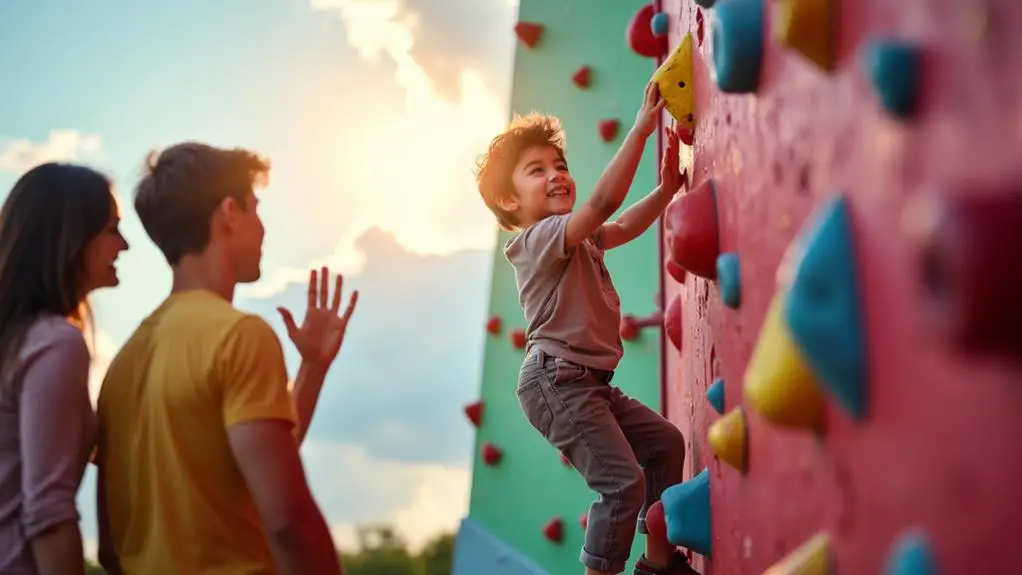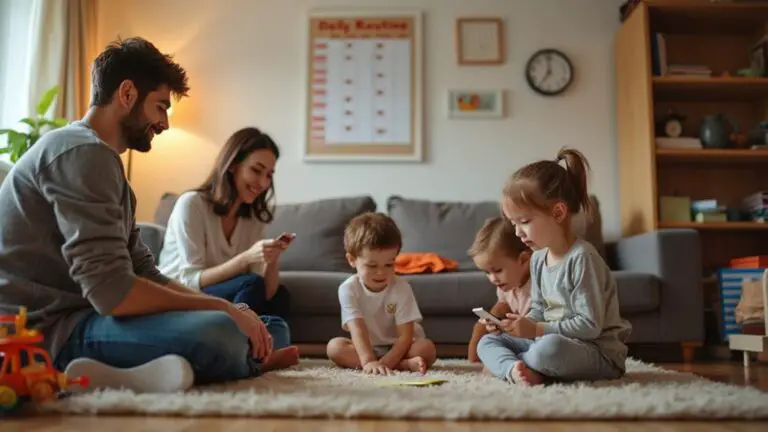Building Self-Esteem in Children
As a child psychologist, I've witnessed firsthand the profound impact of self-esteem on a child's development. I've seen confident kids tackle challenges with gusto, while those lacking self-assurance often struggle to reach their potential. It's not just about feeling good; it's about equipping our children with the emotional tools they need to thrive. But how do we nurture this vital aspect of their growth? The answer isn't simple, and it requires more than just praise. In fact, some common approaches might be doing more harm than good. Let's explore what really works in building lasting self-esteem in our children.
Key Takeaways
- Encourage children to try new activities to discover strengths and build confidence.
- Praise effort and process rather than outcomes to reinforce a sense of capability.
- Foster open communication to help children express feelings and seek support.
- Set achievable goals and celebrate efforts to promote a growth mindset.
- Create a supportive environment focused on emotional security and positive relationships.
Understanding Childhood Self-Esteem
Children's self-esteem is a complex and vital aspect of their development. As a parent or caregiver, I've learned that self-esteem shapes a child's confidence, resilience, and social skills.
It's fascinating to see how early experiences, including supportive caregiving and positive feedback, lay the foundation for healthy self-esteem. I've observed that children with high self-esteem often perform better academically and cope well with challenges.
However, I'm aware that about 70% of adolescents experience fluctuations in self-esteem, influenced by various factors. It's important to recognize signs of low self-esteem, such as withdrawal from activities or declining grades.
When I notice these signs, I know that early intervention is key. By understanding childhood development and the importance of self-esteem, I can better support children in building a positive self-image.
Nurturing Positive Self-Image
Self-image forms the cornerstone of a child's emotional well-being. I've found that nurturing a positive self-image in children is essential for their mental health and overall development.
To foster confidence and self-esteem, I encourage kids to try new things and engage in activities they enjoy. This helps them discover their strengths and feel valued. I also believe in praising effort rather than outcomes, which reinforces their sense of capability.
To cultivate a positive self-image and resilience in children, I recommend:
- Involving them in age-appropriate tasks to boost their sense of belonging
- Teaching them to view mistakes as learning opportunities
- Providing consistent, specific praise focused on effort
- Encouraging them to embrace imperfection and navigate challenges
Overcoming Self-Esteem Challenges

Despite our best efforts, children may face self-esteem challenges that require specific strategies to overcome. I've found that identifying root causes, like bullying or negative peer feedback, is essential. Encouraging open communication helps kids express their feelings and fosters a supportive environment. I've seen how engaging children in enjoyable activities can boost their confidence and sense of belonging.
| Strategy | Benefit |
|---|---|
| Active listening | Improves communication |
| Specific praise | Reinforces efforts |
| Group activities | Enhances confidence |
| Professional help | Provides coping tools |
When offering praise, I focus on specific, constructive feedback rather than general compliments. This approach is more effective in building self-esteem by highlighting individual strengths. If a child continues to struggle, I don't hesitate to seek professional help. Counseling or support groups can provide valuable tools to help kids bounce back and develop a positive self-image.
Fostering Long-Term Confidence
Confidence isn't built overnight; it's a long-term investment in a child's future. I've found that creating a supportive environment focused on emotional security is key to fostering long-term confidence and self-esteem in kids.
By encouraging children to set achievable goals and celebrating their efforts, we help them develop a growth mindset and keep trying, even when faced with challenges.
To build kids' self-esteem and promote feeling good about themselves, I recommend:
- Engaging them in diverse activities to explore new skills
- Praising effort rather than outcomes
- Building strong relationships with caregivers and peers
- Encouraging self-discovery and a sense of control
These strategies help kids develop resilience and maintain confidence throughout their lives.
Conclusion
I've learned that building self-esteem in children is an ongoing process that requires patience and dedication. By creating a supportive environment, encouraging exploration, and praising effort, I can help kids develop a positive self-image. It's essential that I teach them to embrace mistakes as learning opportunities and cultivate resilience. With consistent support and guidance, I can foster long-term confidence in children, setting them up for success in all aspects of life.







